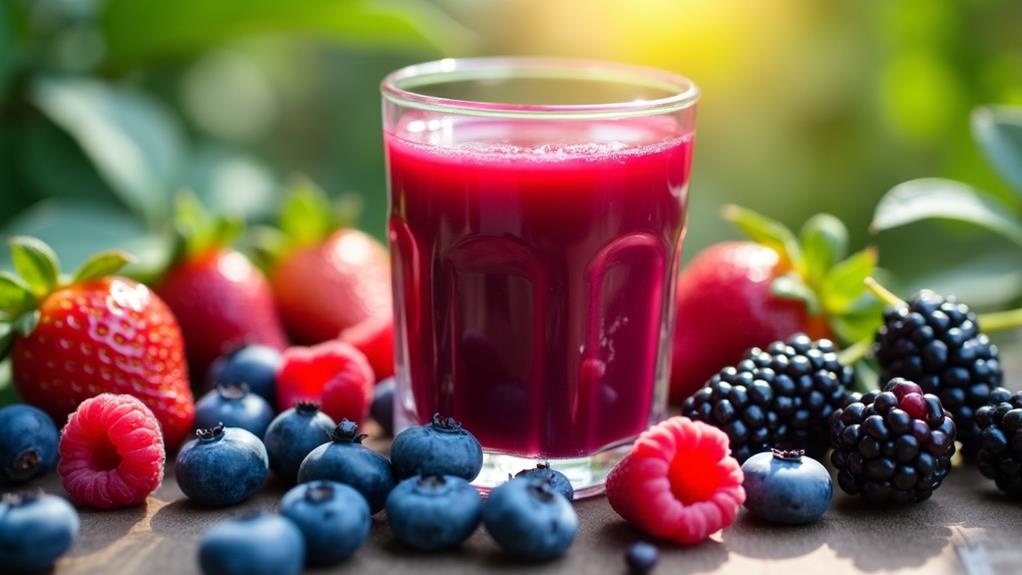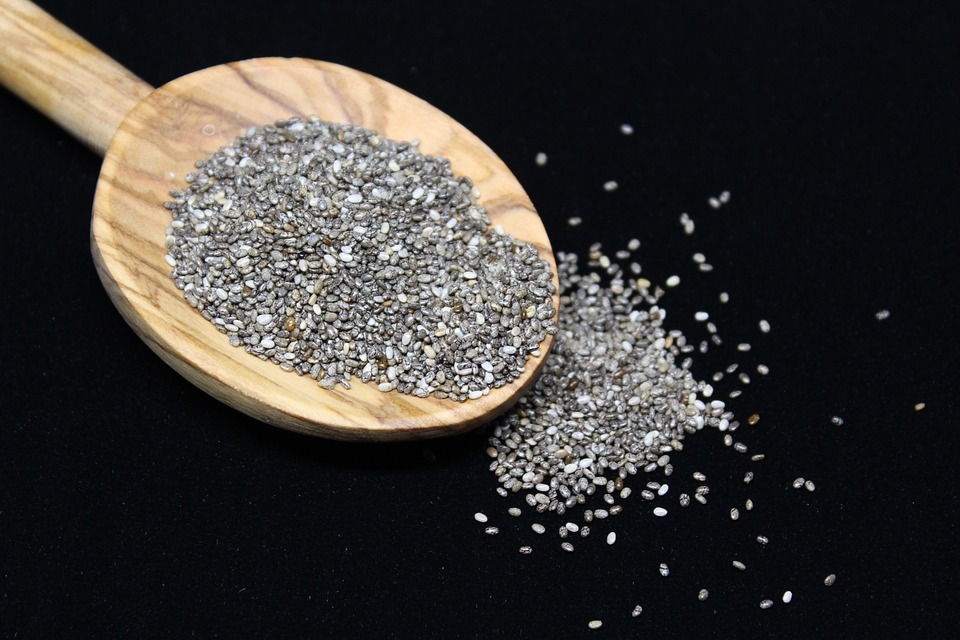Is Orange Juice Healthy? Exploring the Benefits and Risks

Starting your day with a glass of orange juice is often considered a healthy choice due to its high vitamin C and antioxidant content. It can support your immune system and potentially enhance heart health. However, its high sugar content raises concerns. Freshly squeezed options and those with pulp add beneficial fiber for digestion, but moderation is key. To make an informed decision, it's important to weigh the pros and cons of orange juice consumption.
Nutritional Profile
When you pour yourself an 8-ounce serving of orange juice, you're choosing a beverage that's not only low in calories, at around 112 per serving, but also rich in significant nutrients. The nutritional profile of orange juice is impressive, particularly due to its high vitamin content. It provides 67% of your recommended daily intake (RDI) for vitamin C, which is essential for maintaining various bodily functions.
In addition to vitamin C, orange juice offers 15% of the RDI for folate, a nutrient crucial for DNA synthesis and cell division. The juice also supplies 10% of the RDI for potassium, a mineral vital for regulating blood pressure.
Beyond vitamins and minerals, orange juice is abundant in antioxidants such as flavonoids and carotenoids. These compounds help combat oxidative stress, thereby reducing the risk of chronic diseases. If you choose freshly squeezed orange juice with pulp, you'll also gain dietary fiber, which aids in digestion and enhances nutrient absorption.
Immune Support
Orange juice is an excellent choice for bolstering your immune system due to its high vitamin C content, offering 124% of your daily requirement per cup. The antioxidants it contains, such as flavonoids and carotenoids, help reduce oxidative stress and inflammation, thereby enhancing overall immune function. Regular consumption of orange juice may also decrease the likelihood of colds and flu, making it a valuable asset for maintaining respiratory health.
Vitamin C Richness
Orange juice's exceptional richness in vitamin C makes it a powerhouse for bolstering your immune system and overall health. Just one cup of orange juice provides 124% of your daily vitamin C needs, making it a potent ally in supporting immune function. Vitamin C is essential for the production of white blood cells, which are critical for fighting infections. Regular consumption of orange juice may help reduce the risk of colds and promote faster recovery times.
Vitamin C is not only crucial for immunity but also acts as a strong antioxidant. Antioxidants combat oxidative stress and reduce inflammation, providing additional support to your immune system. This dual action makes orange juice a valuable addition to your diet, especially during cold and flu season.
Furthermore, drinking orange juice can enhance iron absorption from plant-based foods. Iron is essential for maintaining energy levels and overall immune health. Including a daily glass of orange juice in your routine can offer significant health benefits, ensuring you stay energetic and resilient against infections. Make it a part of your daily habit, and your immune system will thank you.
Antioxidant Content
Orange juice stands out for its rich antioxidant content, making it an excellent support for your immune system. It is abundant in flavonoids, carotenoids, and ascorbic acid, providing a robust mix of antioxidants that enhance immune function and combat oxidative stress. A single cup delivers 124% of your daily vitamin C needs, a crucial antioxidant that boosts immune health and helps alleviate cold symptoms.
Regular consumption of orange juice offers more than just a delightful flavor; it also significantly aids in reducing inflammation. The antioxidants present in orange juice help lower inflammation levels, decreasing the risk of chronic diseases associated with prolonged inflammation. Scientific research has documented decreases in inflammatory markers such as CRP and IL-6 with consistent orange juice intake, highlighting its anti-inflammatory properties.
Illness Prevention
Orange juice plays a pivotal role in illness prevention and immune support, primarily due to its high vitamin C content. Just one cup provides 124% of your daily vitamin C requirement, significantly boosting your immune system's ability to fend off pathogens. Regular consumption of orange juice has been linked to a lower incidence of colds and respiratory infections, enhancing overall wellness and hastening recovery.
The health benefits of orange juice extend beyond just vitamin C. It is rich in antioxidants like flavonoids and carotenoids, which combat oxidative stress and reduce inflammation, further supporting immune function. Essential minerals such as potassium and magnesium also contribute to maintaining a robust immune system.
Studies indicate that the anti-inflammatory properties of orange juice can lead to reduced levels of inflammatory markers like CRP and IL-6, potentially lowering the risk of chronic diseases. Here are three key points to remember:
- Boosts Immune Response: High vitamin C content enhances pathogen defense.
- Reduces Inflammation: Antioxidants and anti-inflammatory properties lower inflammatory markers.
- Promotes General Wellness: Regular consumption is linked to fewer colds and faster recovery.
Incorporating orange juice into your diet can be a delicious and effective way to support your immune health.
Heart Health

When considering heart health, incorporating orange juice into your diet can offer significant benefits. Regularly drinking orange juice has been shown to lower total and LDL cholesterol levels while increasing HDL cholesterol levels, positively impacting cardiovascular health. The antioxidants in orange juice, such as flavonoids and vitamin C, play an important role in supporting endothelial function and promoting healthy blood flow.
Additionally, orange juice is rich in potassium, providing about 10% of the recommended daily intake per serving. This vital mineral helps regulate blood pressure, reducing the risk of cardiovascular issues. By maintaining ideal blood pressure levels, you're less likely to suffer from heart disease, hypertension, and stroke.
Long-term intake of orange juice has been linked to a reduced risk of heart disease. The high concentration of antioxidants helps mitigate oxidative stress in the body, a known contributing factor to heart disease. These benefits collectively suggest that adding orange juice to your daily routine can be a simple yet effective way to support cardiovascular health. So, next time you're considering a healthy beverage, reach for a revitalizing glass of orange juice to keep your heart in top shape.
Kidney Health
Regular consumption of orange juice can significantly benefit kidney health. Its ability to increase urine pH helps reduce the risk of kidney stones, and its high citrate content specifically prevents calcium oxalate stones. Additionally, the hydration and nutrients in orange juice support overall kidney function and urinary tract health.
Kidney Stone Prevention
Orange juice isn't just a delicious morning beverage; it's also a powerful ally in kidney stone prevention. Regular consumption of orange juice is linked to a 12% lower risk of developing kidney stones. This is because orange juice can increase the pH of your urine, making it more alkaline and less conducive to stone formation. The high citrate content in orange juice further helps by inhibiting the crystallization process that leads to certain types of kidney stones.
Key benefits include:
- Increased Alkalinity: Orange juice raises urine pH, which helps prevent stone formation.
- High Citrate Content: Citrate in orange juice binds with calcium in urine, preventing crystallization and stone formation.
- Superior to Lemonade: Studies suggest orange juice is more effective than lemonade in reducing kidney stone risk factors.
Additionally, staying hydrated with orange juice supports overall kidney health and function. Daily intake provides vital nutrients that contribute to a healthy urinary environment, making it more difficult for stones to develop. So, next time you pour a glass, remember you're not just enjoying a tasty drink; you're also giving your kidneys essential support.
Urinary Tract Benefits
Orange juice offers impressive benefits for urinary tract health, particularly in the prevention of kidney stones. The beverage is high in citrate, which increases urine pH and makes it more alkaline, thereby reducing the likelihood of stone formation. This promotes a healthier urinary tract environment.
Hydration is another key benefit. Proper hydration is essential for kidney function, and orange juice helps maintain optimal fluid levels, aiding the kidneys in waste filtration and overall urinary tract health. Additionally, the potassium in orange juice helps regulate blood pressure and fluid balance, both crucial for kidney health.
Moreover, orange juice can enhance the body's ability to dissolve certain types of kidney stones, making it beneficial for both prevention and management. By incorporating orange juice into your diet, you support comprehensive urinary tract health while enjoying a delicious drink.
Anti-Inflammatory Effects

One notable benefit of regularly consuming orange juice is its anti-inflammatory effects, which can potentially lower the risk of chronic diseases. Regular intake of orange juice can help reduce inflammatory markers like C-reactive protein (CRP) and interleukin-6 (IL-6). This is promising news for those concerned about chronic inflammation and its associated health risks.
The antioxidants in orange juice, such as flavonoids and ascorbic acid, play a crucial role in supporting the immune system and combating oxidative stress. Incorporating orange juice into your diet can offer the following benefits:
- Reduced Inflammatory Markers: Research indicates that orange juice can lower levels of CRP and IL-6, which are commonly elevated in chronic inflammation.
- Antioxidant Support: The abundance of flavonoids and ascorbic acid in orange juice helps neutralize free radicals, reducing oxidative stress and promoting overall health.
- Prevention of Chronic Diseases: By mitigating inflammation, orange juice may aid in preventing chronic conditions such as heart disease and arthritis, making it a valuable addition to a balanced diet.
Potential Risks
When considering orange juice, it's important to be aware of some potential risks. Its high sugar content can cause blood sugar spikes, which is particularly concerning for individuals with diabetes or hypoglycemia. Additionally, regular consumption may hinder weight management efforts due to the added calories.
High Sugar Content
An 8-ounce serving of orange juice contains around 21 grams of sugar, which can significantly impact your daily sugar intake limits as recommended by health authorities. This high sugar content poses several potential health risks.
Firstly, consuming orange juice can cause a notable spike in blood sugar levels. This is particularly concerning for individuals with diabetes or those monitoring their sugar intake, as it can complicate the management of their condition.
Additionally, the high sugar content and calorie density of orange juice can contribute to weight gain. One cup contains about 112 calories, primarily from sugars, and regular consumption can lead to excess calorie intake.
Moreover, most orange juices lack fiber, especially pulp-free varieties, which means you won't feel as full after drinking them. This can result in increased calorie consumption throughout the day, further contributing to weight gain.
Key points to remember:
- Blood sugar spike: Immediate increase in blood sugar levels.
- Weight gain: Extra calories primarily from sugars.
- Lack of fullness: Increased total daily calorie intake.
Being aware of these risks can help you make more informed decisions about your orange juice consumption.
Blood Sugar Spikes
Drinking orange juice can lead to significant blood sugar spikes, posing potential risks for those mindful of their sugar intake. An 8-ounce serving of orange juice contains about 21 grams of sugar. This high sugar content, combined with the lack of fiber, can cause rapid increases in blood sugar levels. In contrast, consuming whole fruit provides fiber that slows sugar absorption, reducing the risk of spikes.
If you're diabetic or have insulin sensitivity, caution is advised. Blood sugar spikes can lead to fluctuations in glucose levels, complicating the management of your condition. The American Heart Association recommends limiting daily sugar intake to 36 grams for men and 25 grams for women. A single cup of orange juice can quickly consume a large portion of this limit, making moderation essential.
While orange juice is rich in antioxidants and offers some health benefits, excessive consumption can lead to risks like insulin resistance over time. Being mindful of added sugars in your diet can help you maintain better overall health.
Weight Management Challenges
Orange juice, while a common breakfast staple, can pose significant challenges for weight management due to its high sugar content. An 8-ounce serving contains around 21 grams of sugar, which can quickly contribute to your daily intake. Considering the American Heart Association's recommendations of limiting sugar to 36 grams for men and 25 grams for women, just one cup of orange juice can consume a large portion of that limit.
Here are three critical points to consider:
- Calorie Density: An 8-ounce cup of orange juice has approximately 112 calories. For those on a calorie-restricted diet, these calories can add up quickly, making it harder to manage weight effectively.
- Low Fiber: Unlike whole fruits, orange juice lacks fiber. This absence of fiber can leave you feeling less satiated, increasing the likelihood of additional snacking and higher overall calorie intake.
- Caloric Compounding: Consuming orange juice along with other high-calorie foods or beverages can exacerbate weight management issues. The high sugar and calorie content of orange juice can rapidly increase your total caloric intake for the day.
Fresh Vs. Bottled

When comparing fresh orange juice to its bottled counterpart, it's clear that fresh juice offers superior nutritional benefits. Freshly squeezed orange juice retains more nutrients and antioxidants than bottled varieties. Bottled options often contain preservatives and added sugars, which can diminish their health benefits. Even when labeled as "100% juice," bottled orange juice might have a lower nutrient density due to processing and storage.
Fresh orange juice naturally includes pulp, providing dietary fiber that aids digestion. On the other hand, pulp-free bottled juices lack this beneficial component. While some bottled juices are fortified with extra nutrients, they typically don't match the freshness and nutrient availability of freshly squeezed options.
Consumers are increasingly choosing fresh orange juice, partly because of concerns about misleading labels and the lower quality associated with many processed juice products. Fresh juice guarantees you get the maximum nutritional value without unnecessary additives. So, when you're deciding between fresh and bottled, keep in mind that fresh orange juice not only tastes better but is also better for your health. By opting for fresh, you're making a choice that supports your well-being more effectively.
Juice With Pulp
Switching from the comparison of fresh versus bottled orange juice, let's explore the benefits of juice with pulp. Choosing juice with pulp means opting for a drink rich in dietary fiber, which aids digestion and helps slow the absorption of sugars, thereby preventing rapid blood sugar spikes. Additionally, the pulp in orange juice offers numerous health benefits that make it a worthwhile choice:
- Increased Satiety: Juice with pulp can help you feel fuller for longer due to its fiber content, aiding in appetite control and reducing the likelihood of overeating.
- Heart Health: The pulp contains both soluble and insoluble fiber, which can help lower cholesterol levels and maintain healthy blood pressure, supporting overall cardiovascular wellness.
- Nutrient Retention: Freshly squeezed orange juice with pulp retains more nutrients and antioxidants compared to processed varieties, providing a more potent dose of vitamins and beneficial compounds that can enhance overall health.
Incorporating juice with pulp into your diet is a straightforward and effective way to boost your fiber intake and enjoy these significant health benefits.
Daily Consumption

Daily consumption of orange juice can significantly benefit your overall health. Drinking it regularly boosts your vitamin C intake, providing up to 124% of the daily value per cup. This essential nutrient supports immune function and general well-being. Additionally, orange juice can improve heart health by lowering total and LDL cholesterol levels while increasing HDL cholesterol.
Regular consumption also reduces the risk of kidney stones by making your urine more alkaline, potentially lowering your risk by about 12%. Despite these benefits, it's important to be aware of its high sugar content. While it offers hydration and essential nutrients, excessive sugar can be a concern, especially if you're monitoring your sugar intake.
Choosing orange juice with pulp can increase your fiber intake, aiding digestion and helping maintain steady blood sugar levels compared to pulp-free varieties. Moderation is key. Enjoying orange juice daily can provide numerous health benefits, but balancing it with other low-sugar drinks and whole fruits ensures you get the best of both worlds.
Healthiest Juice Choices
Daily consumption of orange juice can offer numerous health benefits, primarily due to its high vitamin C content. Just one cup of orange juice provides over 100% of your daily recommended intake, making it an excellent addition to a healthy diet, particularly for immune support and overall well-being.
To make the healthiest juice choices, consider the following options:
- Freshly Squeezed or 100% Pure Bottled Orange Juice: These are rich in nutrients and free from added sugars, making them a good source of essential vitamins and minerals.
- Orange Juice with Pulp: This variety adds fiber to your diet, aiding digestion and helping to stabilize blood sugar levels more effectively than pulp-free options.
- Organic Orange Juice: Choosing organic juice helps you avoid synthetic pesticides and additives, ensuring a cleaner and healthier option.
Always check labels for "100% fruit juice" to confirm there are no added sugars or artificial ingredients. By being mindful of these factors, you can enjoy the benefits of orange juice while maintaining a balanced and healthy diet.




